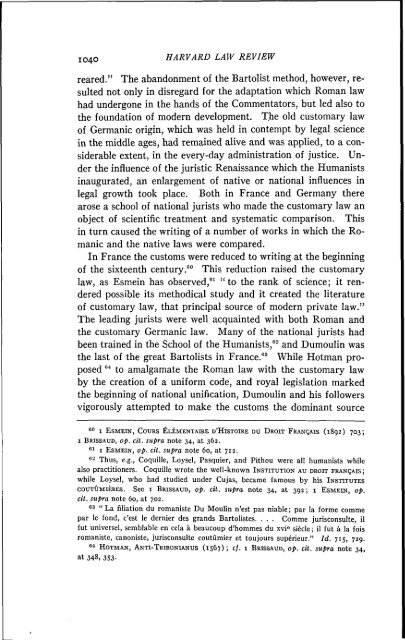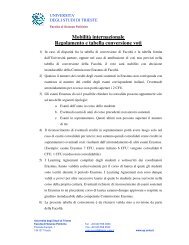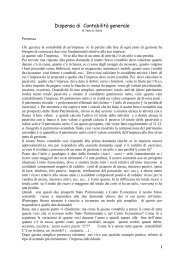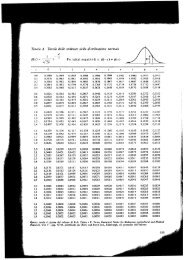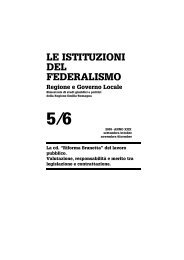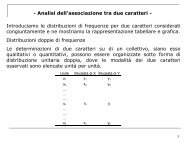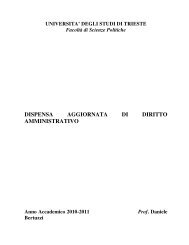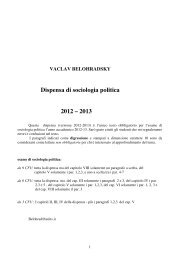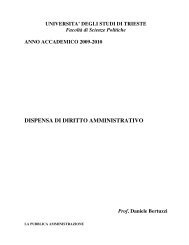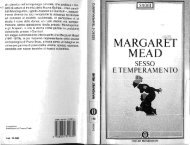THE HISTORY OF COMPARATIVE LAW * ^COMPARATIVE law, as ...
THE HISTORY OF COMPARATIVE LAW * ^COMPARATIVE law, as ...
THE HISTORY OF COMPARATIVE LAW * ^COMPARATIVE law, as ...
Create successful ePaper yourself
Turn your PDF publications into a flip-book with our unique Google optimized e-Paper software.
1040 HARVARD <strong>LAW</strong> REVIEW<br />
reared." The abandonment of the Bartolist method, however, resulted<br />
not only in disregard for the adaptation which Roman <strong>law</strong><br />
had undergone in the hands of the Commentators, but led also to<br />
the foundation of modern development. The old customary <strong>law</strong><br />
of Germanic origin, which w<strong>as</strong> held in contempt by legal science<br />
in the middle ages, had remained alive and w<strong>as</strong> applied, to a considerable<br />
extent, in the every-day administration of justice. Under<br />
the influence of the juristic Renaissance which the Humanists<br />
inaugurated, an enlargement of native or national influences in<br />
legal growth took place. Both in France and Germany there<br />
arose a school of national jurists who made the customary <strong>law</strong> an<br />
object of scientific treatment and systematic comparison. This<br />
in turn caused the writing of a number of works in which the Romanic<br />
and the native <strong>law</strong>s were compared.<br />
In France the customs were reduced to writing at the beginning<br />
of the sixteenth century."" This reduction raised the customary<br />
<strong>law</strong>, <strong>as</strong> Esmein h<strong>as</strong> observed,"^ "to the rank of science; it rendered<br />
possible its methodical study and it created the literature<br />
of customary <strong>law</strong>, that principal source of modern private <strong>law</strong>."<br />
The leading jurists were well acquainted with both Roman and<br />
the customary Germanic <strong>law</strong>. Many of the national jurists had<br />
been trained in the School of the Humanists,"" and Dumoulin w<strong>as</strong><br />
the l<strong>as</strong>t of the great Bartolists in France."^ While Hotman proposed<br />
""' to amalgamate the Roman <strong>law</strong> with the customary <strong>law</strong><br />
by the creation of a uniform code, and royal legislation marked<br />
the beginning of national unification, Dumoulin and his followers<br />
vigorously attempted to make the customs the dominant source<br />
^° I ESMEIN, COURS £LEMENTAIRE D'HISTOIRE DU DROIT FRANQAIS (1892) 703;<br />
I BRISSAUD, op. cit. supra note 34, at 362.<br />
"1 I ESMEIN, op. cit. supra note 60, at 712.<br />
"= Thus, e.g., Coquille, Loysel, P<strong>as</strong>quier, and Pithou were all humanists while<br />
also practitioners. Coquille wrote the well-known INSTITUTION AU DROIT FRANQAIS;<br />
while Loysel, who had studied under Cuj<strong>as</strong>, became famous by his INSTITUTES<br />
couTUMiERES. See I BRISSAUD, op. cit. supra note 34, at 392; i ESMEIN, op.<br />
cit. supra note 60, at 702.<br />
"3 "La filiation du romaniste Du Moulin n'est p<strong>as</strong> niable; par la forme comme<br />
par le fond, c'est le dernier des grands Bartolistes. . . . Comme jurisconsulte, il<br />
fut universel, semblable en cela a beaucoup d'hommes du xvio siecle; il fut a la fois<br />
romaniste, canoniste, jurisconsulte coutumier et toujours superieur." Id. 715, 729.<br />
"* HOTMAN, ANTI-TRIBONIANUS (1567); c/. i BRISSAUD, op. cit. supra note 34,<br />
at 348, 353-


